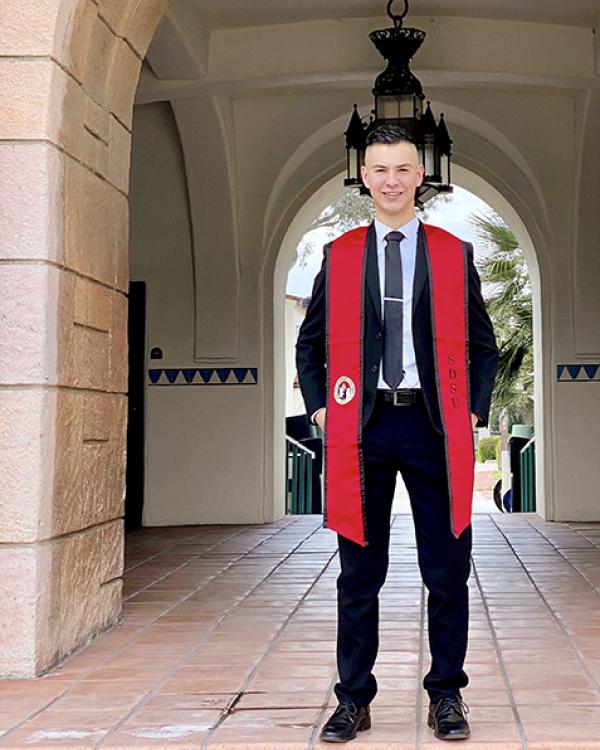
David Rivera at his graduation from San Diego State University
David Rivera (pronouns: he/him/his) is a doctoral student in the counseling psychology emphasis of the Department of Counseling, Clinical and School Psychology working under Dr. Alison Cerezo. Rivera was a selected scholar of the Initiative for Maximizing Student Development (IMSD) program supported by the National Institutes of Health (NIH) during his final academic year at San Diego State University. He is interested in research aimed at addressing sexual and gender minority health disparities with an interest on Latinx individuals. He is also interested in how cultural factors, minority stress, and gender roles relate to the well-being of sexual and gender minority individuals.
GGSE: How have you been killing time during the campus shutdown?
Rivera: For the most part, by streaming Netflix! Given that the pandemic has greatly limited the social activities and some outdoor activities that I typically enjoy, discovering new shows/movies on Netflix is a great way to kill time – it often leads me binge watching an entire season of a show (like the Selena series).
GGSE: Why do you do the job that you do?
Rivera: I do the work that I do because I genuinely find learning about human behavior and cognitive processes fascinating! This knowledge, in combination with clinical training, may then be used to help improve the mental and physical health of individuals, which relates to my interests in addressing sexual/gender minority health disparities among racial/ethnic minority individuals. I have a particular interest in developing and testing interventions to address the needs of this particular population because there are factors that must be considered (e.g., dual minority stress, stigma, etc.) that are not addressed through the common traditional methods of intervention.
GGSE: How do you conduct your research?
Rivera: The research that I am involved in is conducted in a variety of ways. My experience has primarily been with quantitative research methods (e.g., surveys). I have also had some but more limited exposure with qualitative research methods (e.g., interview data). This qualitative data is very rich in context since the participants have the liberty to respond to the questions they are being asked in whichever way they feel makes the most sense to them. Given that both of these methods are valuable in their own way, a mixed methods approach is also common. The data obtained through these research approaches is helpful in the development and tailoring of interventions, as it may help inform which factors are critical to address and be incorporated into an intervention.
GGSE: If you had a time machine, when would you go?
Rivera: If I had a time machine, I would travel to pre-pandemic or post-pandemic times without hesitation! Why? Well life seemed much simpler when we did not have to worry about a global pandemic! Plus, I very much miss hanging out with my friends, dancing Mexican folk, and traveling! I may even prefer traveling to post-pandemic times to be able to go to the potential music concerts of some of my favorite artists, such as Lady Gaga, Ariana Grande, and Dua Lipa, given their recently released albums (great stuff by the way)!